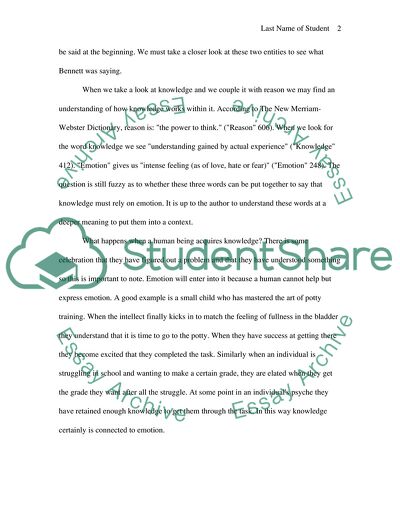
- Home
- Free Samples
- Premium Essays
- Editing Services
- Extra Tools
- Essay Writing Help
- About Us
- Studentshare
- Subjects
- Miscellaneous
- There can be no knowledge without emotion....until we have felt the force of the knowledge, it is not ours (adapted from Arnold Bennett). Discuss this vision of the relationship between knowledge and emotion
There can be no knowledge without emotion....until we have felt the force of the knowledge, it is not ours (adapted from Arnold Bennett). Discuss this vision of the relationship between knowledge and emotion - Essay Example

- Subject: Miscellaneous
- Type: Essay
- Level: Undergraduate
- Pages: 4 (1000 words)
- Downloads: 0
- Author: alanis54
Extract of sample "There can be no knowledge without emotion....until we have felt the force of the knowledge, it is not ours (adapted from Arnold Bennett). Discuss this vision of the relationship between knowledge and emotion"
This says that the word knowledge is up for interpretation by whoever uses the term. In this case, knowledge may be the acquiring of information from educational pursuits or it could be acquired through daily living. When the word "emotion" is studied again there is no concrete definition. Instead, it is "any strong feeling" according to Princeton University. If this is the case then knowledge and emotion cannot really be brought together as having any correlation between them at all; at least this is what may be said at the beginning.
We must take a closer look at these two entities to see what Bennett was saying. When we take a look at knowledge and we couple it with reason we may find an understanding of how knowledge works within it. According to The New Merriam-Webster Dictionary, reason is: "the power to think." ("Reason" 606). When we look for the word knowledge we see "understanding gained by actual experience" ("Knowledge" 412). "Emotion" gives us "intense feeling (as of love, hate or fear)" ("Emotion" 248). The question is still fuzzy as to whether these three words can be put together to say that knowledge must rely on emotion.
It is up to the author to understand these words at a deeper meaning to put them into a context. What happens when a human being acquires knowledge? There is some celebration that they have figured out a problem and that they have understood something so this is important to note. Emotion will enter into it because a human cannot help but express emotion. A good example is a small child who has mastered the art of potty training. When the intellect finally kicks in to match the feeling of fullness in the bladder they understand that it is time to go to the potty.
When they have success at getting there they become excited that they completed the task. Similarly when an individual is struggling in school and wanting to make a certain grade, they are elated when they get the
...Download file to see next pages Read MoreCHECK THESE SAMPLES OF There can be no knowledge without emotion....until we have felt the force of the knowledge, it is not ours (adapted from Arnold Bennett). Discuss this vision of the relationship between knowledge and emotion
Philosophy of Emotion
Theory of Knowledge: Emotion and Reason in Evolving Moral Decisions
Emotion and cognition
Relationship between Emotions and Age
The Ambiguity of the Notion of Knowledge
When to Trust Our Emotions in the Pursuit of Knowledge
Whether Emotions Can Accelerate the Pursuit of Knowledge
Motion Planning Knowledge

- TERMS & CONDITIONS
- PRIVACY POLICY
- COOKIES POLICY